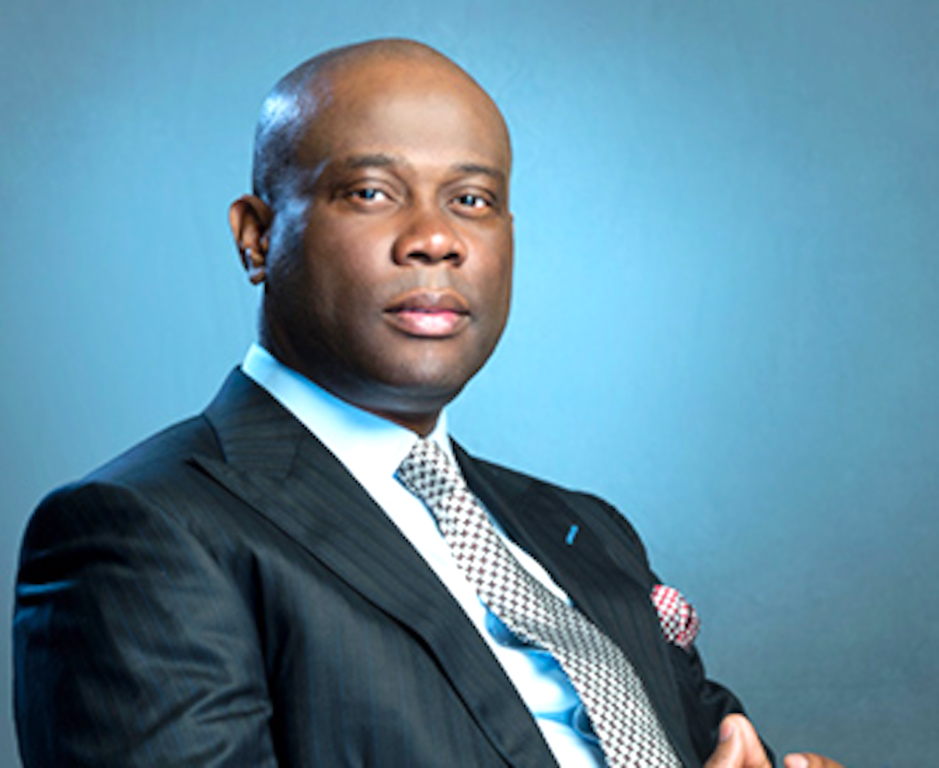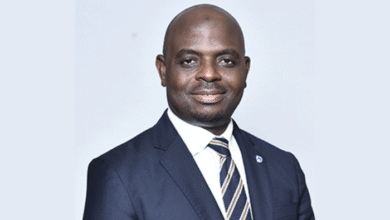HERBERT WIGWE : UNDER THE HEAT OF COSTS

Access Bank emerges industry’s biggest by assets and revenues
Investors worst hit as it delivers poorly at bottom line
Herbert Wigwe is an ambitious CEO, and a challenger too. He is neither content to follow nor afraid of orthodoxy , but his firm desire is to rewrite the rules of the game .Like other CEOs in the corporate world , he sets his visions and missions ; and his own strategic architecture, a road map to translate his dreams to reality. , is all focused on changing the destiny of his bank. By now , it is crystal clear and indisputable that a major priority driving the leadership ambition of Access Bank Plc under him is acquisition and merger . From the rested controversial Intercontinental Bank to Diamond and several others in the recent time , the bank appears to be insatiable . How far could this strategic choice see this bank in its battle for the industry’s leadership? This is the question whose answer is not yet unknown.
For his admirers ,the arrowhead of stardust execution of exquisite mergers and acquisition is already delivering. From the look of things ,the strategy is paying off giving additional wings to Wigwe to soar higher and overtake some incumbents in the industry . .In the last financial year 2020, it emerged the biggest bank by assets and revenue; its customer base took a swing giving it another lead in customer deposit . However , analysts are asking , what is the essence of owning the biggest assets that could not give it a laurel where it matters most: the bottom line ?
In 2020, he delivered another solid and resilient figures, albeit at the top-line despite a challenging economic and regulatory landscape . The asset base of the Group remained strong and resilient with Total Assets of N8.68trn in December 2020, a growth of 22% YTD from N7.14trn in December 2019 . Gross Earnings also grew by 14.7% to N765bn from N667bn in the previous quarter. A puffy assets level could indicate improved strengths in mopping up transactions, including a better position in maturity transformation, – the stuff banks are best suited for. It can also mean that the bank has applied some elastic to its wings in the form of more customer touch points, branches and Point of Sale devices. For Access , it was all of these and more.
It recorded an impressive growth in its retail banking business, leading to a 5.8mn growth in customer sign-on during the year via its financial inclusion drive and retail revenue of N177.2bn as against N107.8bn in 2019 . Its customer deposits grew by 31% to N5.59trn in Dec 2020 compared to N4.26trn in2019 with savings account deposits of N1.31trn.
The above achievements may not be farfetched. With its size advantage over others the bank has gained over time , it has given it a capacity to match the resources and global distribution of large competitors that brings advantages ,helped it to have a disproportionate share of its resources to training and education, to become significant employers and to open doors of mega opportunities . By these advantages , Wigwe has surely reshuffled the leadership equations ; while this is already giving those his bank has overtaken a sleepless night, it is equally keeping those ahead of his bank to their feet .
However, while its chain of acquisition has provided the management the necessary potentials for industry leadership ,it has not optimized them. Wigwe’s critics believe , he still needs to learn the finishing from few superior colleagues if his bank will not remain in the race a mere catch up .
This is what is generating concerns and worries and the reason is not far to seek. Its bottom line , they believe, is too cold for comfort simply for its inability to covert revenue to profit .Though the bank grew it assets to clinch the first position in the industry and garnered the biggest gross earnings , bigness without leverage is mere obesity just like smallness without leverage is impotence . To gain a disproportionate share of future profits it is necessary to posses a disproportionate share of the requisite competencies. These competencies represent the patient and persistent accumulation of intellectual capital as opposed to assets which don’t enhance the bottom line.
Access Bank is not pulling weight here relative to some of its peers. At the bottom line level , its profit before tax for the period rose by 13% y/y to N125.9bn (FY 2019: N111.9bn) ; profit after tax (PAT) also grew by 13% y/y to N106.0bn from N94.1bn in FY 2019 .
On the face value, the percentage jumps could be very attractive , but the real picture of this bank’s deficiency is better displayed by pre tax margins or how many kobo of the profit the bank has generated for each naira of its revenue before deducting tax or its net income margins which is how much of each naira in revenue collected is translated into profit after tax is deducted. In the period under review , its net income margins stayed almost flat moving slightly down from 14% in 2019 to 13.9 % in 2020. This indicates that a paltry sum of 14k is made from every one naira from its revenue. Its unimpressive bottom line is also glaringly revealed by return on equity at 15.6% in 2020 ,,which indicates the made only N15.60 from every N100.00 of its shareholder equity . Its return on assets is 1.2 % in the same period . it is a measure of the profitability of any firm and the strength of bottom line is a strong determinant.
A comparative analysis of Access Bank with its tier1 peers further confirmed that despite its size advantage in terms assets which delivered the biggest earnings at the top line , it is much more in need of better skilful hands to prime down its operating costs for better value creation and competitiveness . A look into the books of GTB ,another tier 1 bank and a peer of Access Bank , confirms a saying that bigness without a good leverage Access is a mere obesity. GTB’s total assets and Shareholders’ Funds closed at ₦4.945trillion and ₦814.4billion respectively at the end of 2020 financial year while Access Bank’s total Assets stood at N8.68trn and shareholders funds at N751bn in December 2020 . In spite of GTB’S gross earnings of N455.23bn against the Gross Earnings of Access Bank at N765bn in 2020 ,GTB’s profit before tax hit N238.09bn while its post tax profit of N201,440billion in 2020 . This is efficiency at work ; GTB ,indeed, has proved that it’s not what you get but what you make out of it that matters . This translates to a pretax margin of 52% and a net income margin of 44%. Both of these show how a bank is managing operating costs .
.To cement its place as the most efficient bank and achieve more with less , its return on equity (ROE), and return on assets (ROA) remain the industry best . It achieved a Post-Tax Return on Equity (ROAE) of 26.8% while its Post-Tax Return on Assets (ROAA) stood at 4.6% . Another tier 1 bank which exposes the inefficiency of Access Bank and confirms that a race to build size without efficiency is irrational is Zenith Bank Plc. Its total assets at the end of N8.48 trillion while its full year Gross Earnings was N696.45 billion, both below Access Bank’s figures . However having made allowance for Tax Expenses, the Profit reported for the period 2020 hit N230.56 billion giving it a Pre-Tax Margin stood at 36.74% same as the estimate in the corresponding year and Return on Average Equity of 20.64% .
The sharp contrast between Access Bank and the two tier 1 banks indicated above may not be farfetched . It a factor of cost control and efficiency . Wigwe is surely under the heat of costs. As at the end of the last financial year of 2020, Access Bank’s cost to income ratio was 63 % compared to GTB’s 38.24% . Access Bank’s cost-to-income ratio increased to 65.8% for H1 2020 from 61.0% recorded in H1 2019 ; this was driven by an increase recorded in operating expenses. The major driver of the increase recorded +49.76% in operating expenses was the Y-o-Y increase recorded in outsourcing cost . Operating Expenses for Zenith Bank is estimated at 32.65% of the Gross Earnings Value estimated for the year, this is a marginal growth from the 31.30% estimated from 2019 financial statistics ; for GTB is 33 % while for Access Bank it is 43% .
The above positions Access Bank relative to its peers are ,no doubt, driving its stock value low and determining its weak market perception . Access Bank’s market capitalization is abysmally low compared to its peers at N280.3 b .The movement in the price of shares of Access Bank in 2020 reflected the uncertainty that trailed the year. The share price fell to its lowest levels in March 2020 which was the peak of the lock downs and restrictions induced by the COVID-19 pandemic, there was a rebound in share price in the third and fourth quarter although not at the high pre-pandemic levels. The share price of the bank closed the year negative; it fell by -15.50%. The bearish trend has continued in its year-to-date (YTD) performance, declining by -5.33% as of 31st March 2020.
Its one year share price market return at 21.1% underperforms both the industry and the market returns at 34.2% and 69.2% respectively . Its share price is NGN 8.05 . ACCESS began the year with a share price of 8.45 NGN but has since lost 4.73% off that price valuation, ranking it 116th on the NSE in terms of year-to-date performance.
Moreover, Its high level of non-cash earnings and unstable dividend track record are part of what put off some stock investors and determine its share value. Its earnings grew by 12.5% over the past year while Price earnings ratio at 2.7x indicating investors are willing to part with more cash to own more share of its stock, but this is still i below the NG market at 7.8x . However, its earnings are forecast to grow 14.46% per year .
A detailed analysis of its 2020 financial book revealed how Wigwe was rendered helpless by unwieldy cost at the bottom line despite whooping gross earnings of N765bn secured at the top line in the year . In the year under review interest income as usual was its dominant source of income with massive contribution to the gross earnings. However, translating interest earning assets to income was a tug of war as the risk terrain became more intimidating posing more threat . This is not unusual. When one is said that one is a good or astute banker ,what ,in fact is meant is that one is a shrewd lender or risk taker , lending money safely and profitably . At the end of the financial year, only few players sailed through the stormy water without injuries : stagnant growth, declining margins and falling market share were major dark spots that littered their scorecards .
However, in spite of the highly deleterious risk environment , he jerked up its bank’s net loans and advances by 18% to N3.61trn from N3.06trn in Dec 2019 .But for Wigwe led management too , it was a hard nut . He garnered a total sum of N489 ,216, 705 compared to N536 ,846, 789 in 2019 amounting to a drop of 9% . This happened despite bringing its interest expenses down by 13% from N259, 618b in 2019 to N226,267b in 2020 .Consequently , its net interest income backtracked by 5% to N262,950 b from N277,229b in 2019. This is shows a defeat in a hot battle of interest rates between interest earned and those paid out by the bank . A bigger spoiler to the profitability of the bank however came from a 212% jump in its impairment charge which skyrocketed from N20,189B in2019 to N62,893B in 2020 sliding its net income after impairment by 22% to N200,057 B from N257,039B in the corresponding year of 2019 .
Although he achieved a moderate ratio of non -Performing loans (NPL) ratio at 4.3% as at December 2020 as against 5.8% in 2019 , this was done at a high cost to the bank . It had a backlog of bad loans mostly inherited from its acquired Diamond Bank Plc. Grappling with the challenge of competing in a harsh environment , Wigwe was at work, sleeves rolled-up, digging a trench for massive bad and delinquent loans of N105bn as write-off . This affected bottom line but some analysts said this is a sinecure for a stronger balance sheet in the coming year .
However , the management appeared undeterred with spirited efforts to make up for the less impressive performance in the core banking business income which it did. Its non net fee and commission income grew impressively by 26.4% to N93,573B from N74,047B in 2019 . It first grew its fee and commission income by 27% to N116,700,349 from N91,845,402 but with a faster growing fee and commission expenses by 30%, net fee income only grew by the above amount ,which anyway is still not bad .
Another opportunity that could have saved its bottom line from sliding to the nadir from the whooping gross earnings or top line was 86% growth registered as net gains on financial instrument to N122,690B in 2020 from N 66,102B in 2019 . Moreover, it cut down sharply the loss recorded in its currency revaluation which stood at N83, 876 B , by 91% loss 2019 to N7,568B in2020 .
However, its massive operating expenses which increased by 27% to N326,509 b in 2020 compared to N 257,243 B in 2019 frustrated the hope. The picture of the damage done to the bottom line becomes clearer when the two figures are viewed in absolute term . While personnel expenses backtracked to 73,173,177 , a 5% drop from N76,984B in 2020 , other operating expenses skyrocketed by 43% to N215 ,807 B from 151,098,113 B. The slump in the other operating income also wrecked further havoc on the bottom line sliding downward by 20.3% to N 44,474B in 2020 from N55,836B in 2019 . After interplay of forces from the cost and income handles , the bottom line was messed up relative to its peers with revenues at the top lines .
Bank management, indeed, is coterminous with risk management ; this fundamental nature of banking that is inherent in maturity transformation and it is where the boys are separated from men . However risks recede as knowledge grows and as knowledge grows , so does the firm’s capacity to move forward .
In the financial year 2020, blames were heaped on the negative impacts of Covid 19 pandemic headwinds, but it is difficult to argue that a company is systematically disadvantaged by every aspect of its institutional environment. Foresight, stretch, and leverage provide the energy and rationale for proactive advantage building and industry re-engineering. In blaming institutional factors for competitive ill-health, companies are prone to overlook their competitors share the same institutional disadvantages. For Access Bank to translate its leadership ambition to reality we are convinced that the starting point for competitive revitalization is an understanding of a company’s “genetic code.” In the managerial context, this is concerned with the way its managers perceive their industry, the bank , their roles, and the ways in which these perceptions predispose them to behave in particular circumstances.
Access bank’s leadership in assets base and supersonic flight in other balance metrics may not be far to seek . Its strategic actions that the Bank has taken over the past 12 months evident in a strong focus on retail banking and financial inclusion, an African expansion strategy and a drive for scale for sustainable value creation. After took over Diamond Bank Plc , in 2020, it proudly opened its doors for business in Kenya and Mozambique, to further increase its footprints across the African Continent. Access Bank Zambia also concluded the acquisition of Cavmont Bank Limited in January 2021 and the Group recently announced the approval by relevant regulatory authorities for the acquisition of Grobank Limited, creating an inroad into the South African market in realization of the Group’s strategic ambitions. This ambitious strategy did not only enhance its asset base and gross earnings , its deposits and equity were equally boosted.




